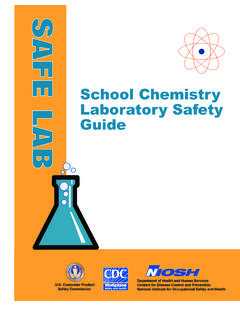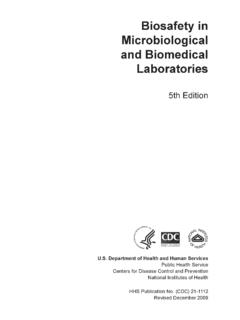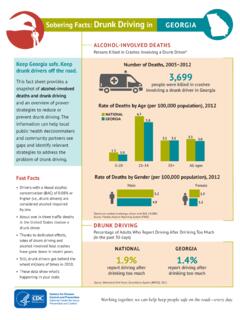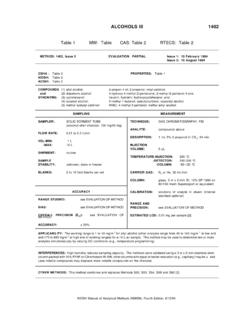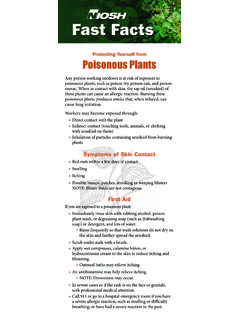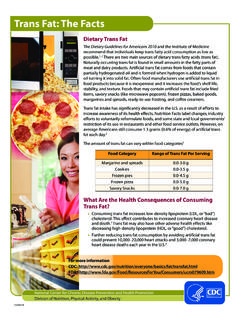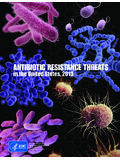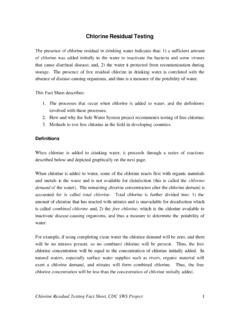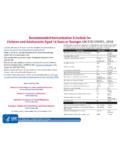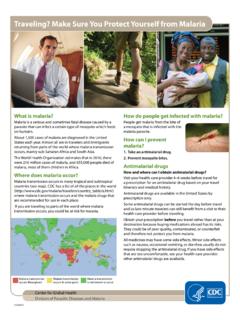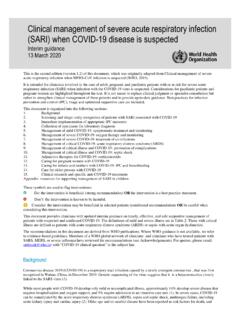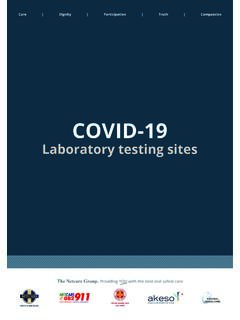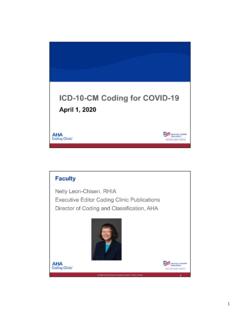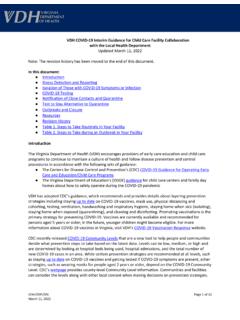Transcription of Prevaccination Checklist for COVID-19 Vaccination
1 CS321629-E1 Prevaccination Checklist for COVID-19 VaccinationFor vaccine recipients: The following questions will help us determine if there is any reason you should not get the COVID-19 vaccine today. If you answer yes to any question, it does not necessarily mean you should not be vaccinated. It just means additional questions may be asked. If a question is not clear, please ask your healthcare provider to explain Are you feeling sick today?Ye sNoDon't know2. Have you ever received a dose of COVID-19 vaccine? If yes, which vaccine product(s) did you receive? Pfizer-BioNTech Moderna Janssen (Johnson & Johnson) Another Product How many doses of COVID-19 vaccine have you received? Did you bring your Vaccination record card or other documentation?3. Do you have a health condition or are you undergoing treatment that makes you moderately or severely immunocompromised? (This would include treatment for cancer or HIV, receipt of organ transplant, immunosuppressive therapy or high-dose corticosteroids, CAR-T-cell therapy, hematopoietic cell transplant [HCT ], DiGeorge syndrome or Wiskott-Aldrich syndrome)4.
2 Have you received hematopoietic cell transplant (HCT) or CAR-T-cell therapies since receiving COVID-19 vaccine?5. Have you ever had an allergic reaction to: (This would include a severe allergic reaction [ , anaphylaxis] that required treatment with epinephrine or EpiPen or that caused you to go to the hospital. It would also include an allergic reaction that caused hives, swelling, or respiratory distress, including wheezing.) A component of a COVID-19 vaccine, including either of the following: Polyethylene glycol (PEG), which is found in some medications, such as laxatives and preparations for colonoscopy procedures Polysorbate, which is found in some vaccines, film coated tablets, and intravenous steroids A previous dose of COVID-19 vaccine6. Have you ever had an allergic reaction to another vaccine (other than COVID-19 vaccine) or an injectable medication? (This would include a severe allergic reaction [ , anaphylaxis] that required treatment with epinephrine or EpiPen or that caused you to go to the hospital.)
3 It would also include an allergic reaction that caused hives, swelling, or respiratory distress, including wheezing.)7. Check all that apply to you: Am a female between ages 18 and 49 years old Am a male between ages 12 and 29 years old Have a history of myocarditis or pericarditis Have been treated with monoclonal antibodies or convalescent serum to prevent or treat COVID-19 Diagnosed with Multisystem Inflammatory Syndrome (MIS-C or MIS-A) after a COVID-19 infection Have a bleeding disorder Take a blood thinner Have a history of heparin-induced thrombocytopenia (HIT) Am currently pregnant or breastfeeding Have received dermal fillers Have a history of Guillain-Barr Syndrome (GBS)12/02/2021 Form reviewed byDateAdapted with appreciation from the Immunization Action Coalition (IAC) screening checklistsThis page was intentionally left Checklist for COVID-19 Vaccines Information for Healthcare ProfessionalsFor additional information on COVID-19 vaccine clinical guidance, see additional information on Advisory Committee on Immunization Practices General Best Practice Guidelines for Immunization, see vaccines are authorized and approved for different age groups and are given intramuscularly.
4 VACCINE PRODUCTAUTHORIZED AGE GROUPSSERIESINTERVALP fizer-BioNTech COVID-19 Vaccine (Orange cap and orange border on the label)5 through 11 years of agePrimary: 2 doses21 daysAdditional primary dose: N/A* N/ABooster dose: N/A* N/APfizer-BioNTech COVID-19 Vaccine (Purple cap and may have a purple border on the label)12 years of age and olderPrimary series: 2 doses21 daysAdditional primary dose: 1 dose*At least 28 days after last primary series doseBooster dose: 1 dose for persons 18 years of age and older* At least 6 months after last primary series dose or additional primary doseModerna COVID-19 Vaccine18 years of age and olderPrimary series: 2 doses28 daysAdditional primary dose: 1 dose*At least 28 days after primary series doseBooster dose: 1 dose* At least 6 months after last primary series dose or additional primary doseJanssen COVID-19 Vaccine (Johnson & Johnson)18 years of age and olderPrimary series: 1 doseN/AAdditional primary dose: N/A*N/ABooster dose: 1 dose* At least 2 months (8 weeks) after primary dose* See question 2 below for additional information regarding recommendations for additional (3rd) primary dose or booster dose.
5 Booster doses can be a different COVID-19 vaccine Observation Times for People without Contraindications to COVID-19 Vaccination30 minutes: People with a history of: A contraindication to another type of COVID-19 vaccine product ( , mRNA or viral vector COVID-19 vaccines) Immediate (within 4 hours of exposure) non-severe allergic reaction to a COVID-19 vaccine or injectable therapies Anaphylaxis due to any cause Immediate allergic reaction of any severity to a non- COVID-19 vaccine15 minutes: All other people12/02/2021CS321629-E4 Prevaccination Checklist for COVID-19 VaccinesInformation for Healthcare ProfessionalsCo-administration of COVID-19 vaccines and other vaccinesCOVID-19 vaccines and other vaccines may be administered without regard to timing. This includes simultaneous administration of COVID-19 vaccines and other vaccines during the same visit. Other vaccines can also be administered anytime before or after COVID-19 Vaccination .
6 1. Are you feeling sick today? While there is no evidence acute illness reduces vaccine efficacy or increases adverse reactions, as a precaution, delay vaccinating patients with moderate or severe illness until the illness has improved. Defer Vaccination of people with current SARS-CoV-2 infection until the person has recovered from acute illness and has discontinued isolation. This recommendation applies regardless of whether the SARS-CoV-2 infection occurred before the recipient received an initial dose or between doses. Viral or serological testing to assess for current or prior infection solely for the purpose of vaccine-decision making is not with mild illnesses can be vaccinated. Do not withhold Vaccination if a person is taking Have you ever received a dose of COVID-19 vaccine?VACCINE PRODUCTP rimary Series Dosage (Amount) Booster Dosage (Amount)Pfizer-BioNTech COVID-19 Vaccine (Orange Cap) 5 through 11 years of age mL N/APfizer-BioNTech COVID-19 Vaccine (Purple Cap) 12 years of age and older mLModerna COVID-19 mLJanssen COVID-19 Vaccine (Johnson & Johnson) mLPeople 5 years of age and older should receive a primary series of COVID-19 vaccine.
7 All COVID-19 primary series doses and additional primary doses should be the same vaccine product. Booster doses, for eligible persons, may be a different product than the COVID-19 vaccine product used in the primary series ( , mix and match may be used for boosters). To determine previously administered COVID-19 doses, check medical records, immunization information systems, and Vaccination record cards to help determine the initial product received. If the vaccine product for a primary mRNA dose cannot be determined or is no longer available, any available mRNA vaccine may be administered (separate doses by at least 28 days). If a different mRNA COVID-19 vaccine is inadvertently administered for the primary series or additional primary dose, the dose is considered valid, and no additional doses of either product are who were vaccinated as part of a clinical trial should consult with the trial sponsors to determine if it is possible to receive additional doses.
8 Ages 5 through 11 years of age: Pfizer-BioNTech (orange cap), 2-dose primary seriesAges 12 through 17 years of age: Pfizer-BioNTech (purple cap), 2-dose primary seriesAges 18 and older: Pfizer-BioNTech (purple cap), 2-dose primary series followed by 1 booster doseModerna, 2-dose primary series followed by 1 booster doseJanssen (Johnson & Johnson), 1-dose primary series followed by 1 booster doseImmunocompromised PersonsSee answers to question 3 to determine if an additional primary dose is recommended. 12/02/2021CS321629-E5 Prevaccination Checklist for COVID-19 VaccinesInformation for Healthcare ProfessionalsFor people who received a COVID-19 vaccine outside the United States: See Interim Clinical Considerations for Use of COVID-19 Vaccines Currently Approved or Authorized in the United States ( ) for a list of WHO vaccines for emergency use and additional guidance for people who received COVID-19 vaccine outside the United States.
9 People who received all recommended doses of an FDA- authorized or -approved COVID-19 vaccine or a WHO-EUL COVID-19 vaccine do not need any subsequent primary series doses. People who received the first dose of an FDA-authorized or -approved COVID-19 vaccine that requires two doses do not need to restart the vaccine series in the United States but should receive the second dose as close to the recommended time as possible. People who completed a mix-product regimen of FDA-authorized, FDA-approved, or WHO-EUL COVID-19 vaccines are considered fully vaccinated and do not need to restart a COVID-19 primary series. People who received only the first dose of a 2-dose WHO-EUL COVID-19 vaccine primary series or who received all or some of a COVID-19 vaccine primary series doses not on the WHO-EUL list may be offered a complete FDA-approved or -authorized COVID-19 primary series. Wait at least 28 days after the last dose of the previous product before administering vaccine.
10 People who completed a primary Vaccination series of an FDA- approved or -authorized vaccine mRNA vaccine (including a mixed mRNA product primary series) may receive an additional primary mRNA dose at least 28 days after the second mRNA vaccine if they are moderately or severely immunocompromised. People who have completed a primary Vaccination series of an FDA-approved or -authorized COVID-19 vaccine may receive or a booster dose if they are eligible. People who completed a primary series of a COVID-19 vaccine that is not FDA-approved or -authorized but is listed for emergency use by the World Health Organization and people who completed a mix-product regimen of FDA-authorized, FDA-approved, or WHO-EUL COVID-19 vaccines are eligible for An additional primary dose of Pfizer-BioNTech COVID-19 Vaccine, if 12 years of age or older and moderately to severely immunocompromised A single Pfizer-BioNTech booster dose, if 18 years of age or older3.
